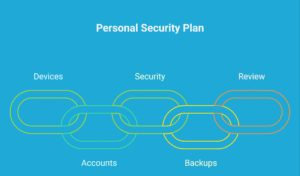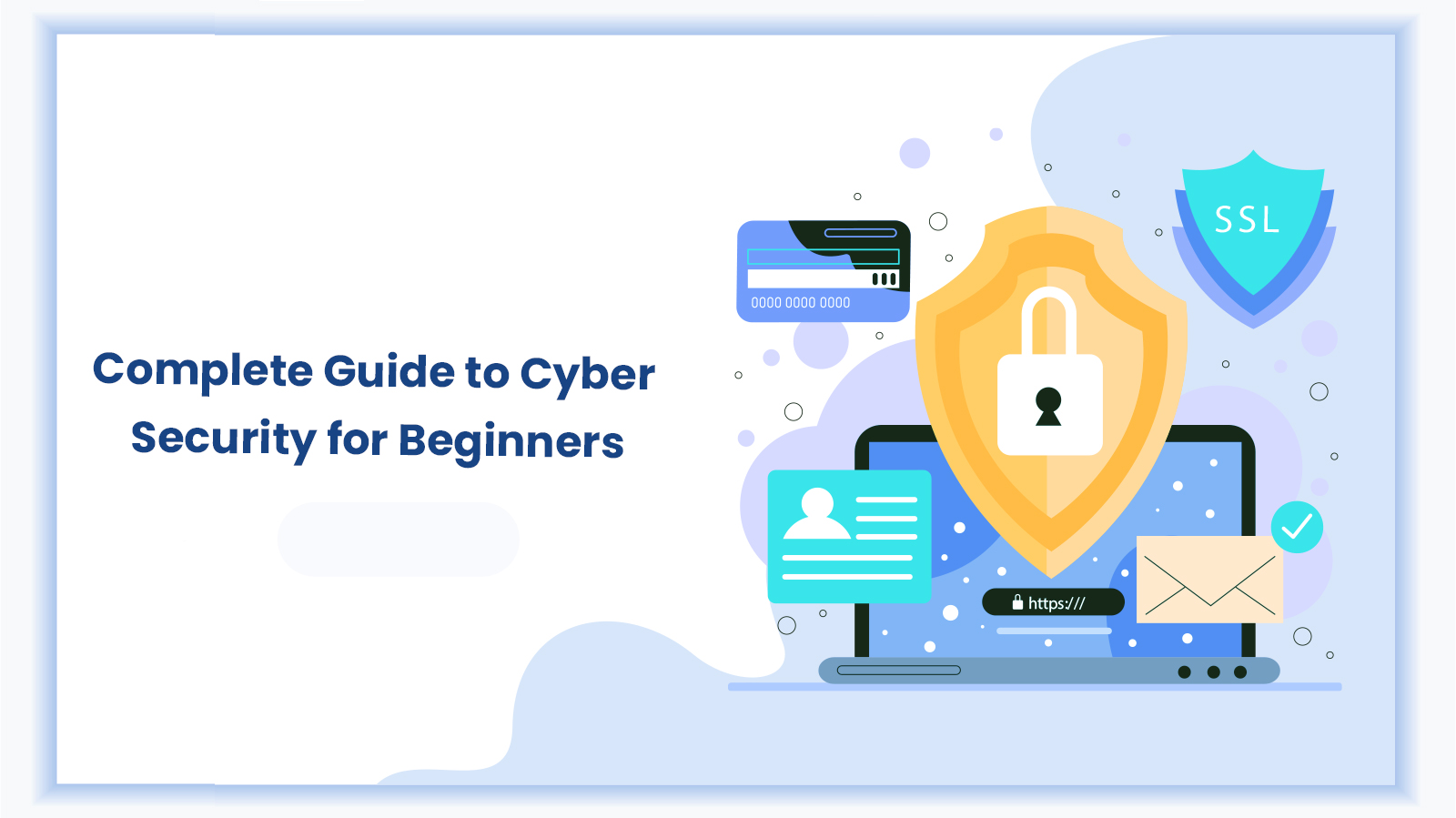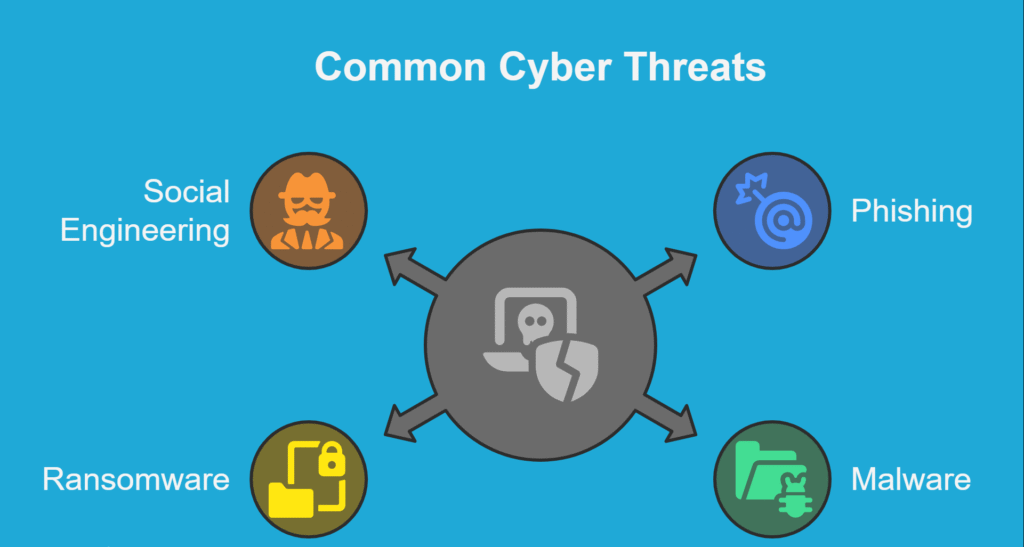TL;DR (Quick Summary)
Cyber security is like having a strong shield on your front body. It keeps cyber criminals away from your digital world. In today’s world, we use computers, phones, and the internet on a daily basis. This makes us targets for cyber criminals who want to steal our information or money and misuse it.
This guide will teach you every single thing about cyber security in simple words. You will learn what cyber threats are and how to protect yourself. We will also talk about the best cybersecurity courses you can take to study more.
Introduction
Millions of people worldwide use computers and smartphones on a daily basis. However, many people are unaware of how to stay safe when using the internet. Cybercriminals are constantly searching for methods to steal your money, credentials, and personal data.
This guide will give you a complete idea of cybersecurity. You’ll discover easy ways to stay safe online. To help you develop your skills, we will also show you the top cybersecurity courses.
This guide contains all the information you require, whether you wish to safeguard your personal information or pursue a career in cyber security.
What is Cybersecurity?
Cybersecurity is all about keeping our computers and data safe from the not so good people online. Cybersecurity is the same as having a bodyguard for your digital self. Just like we lock the doors of our homes to keep thieves out, cyber security locks the doors of our digital world. The CIA triad represents the three principles of cyber security; confidentiality, integrity, and availability.
These three principles work together to protect your information. Confidentiality means that only those who are allowed can view your information. Integrity means that your data means the data is correct and not altered. Finally, availability means you are able to access your information at will.
Common Cyber Threats You Should Know
1. Phishing Attacks
Phishing is like a fake email that looks real. Bad people send these emails to trick you. They might say they are from your bank or a website you use. They want you to give them your password or credit card number.
2. Malware
Malware is bad software that gets into your computer. It can steal your files or make your computer slow. Viruses, worms, and trojans are all types of malware.
3. Ransomware
This is very dangerous malware. It locks all your files and asks for money to unlock them. Many businesses have lost millions of dollars because of ransomware.
4. Social Engineering
This is when bad people trick you by pretending to be someone else. They might call you and say they work for your internet company. Then they ask for your personal information.
Types of Cybersecurity
Type | What It Protects | Example |
Network Security | Internet connections | Firewalls, VPN |
Information Security | Data and files | Encryption, Passwords |
Application Security | Software and apps | Updates, Secure coding |
Endpoint Security | Devices | Antivirus, Device management |
Cloud Security | Online storage | Access controls, Encryption |
How to Protect Yourself Online
Strong Passwords
When creating passwords, make them hard to guess. Always try to put a mixture of big, small letters, numbers and symbols. Do not ever use the same passwords for everything.
Good password: Sunshine!River_92BlueTree
Bad password: password123
Two-Factor Authentication
This adds extra security to your accounts. Even if someone knows your password, they need a second thing to get in. This could be a code sent to your phone.
Keep Software Updated
Updates fix security problems. Always install updates for your computer, phone, and apps. Turn on automatic updates if you can.
Be Careful with Emails
Do not click on links or download files from emails you do not trust. If an email looks suspicious, delete it. When in doubt, ask someone for help.
Use Antivirus Software
Good antivirus software can find and remove malware from your computer. Keep it updated and run scans regularly.
Best Cyber Security Courses for Beginners
Learning cybersecurity can help protect you and even start a new career. Here are some great options:
Free Online Cybersecurity Courses with Certificates
- Google Cybersecurity Courses Google offers excellent cybersecurity courses on Coursera. These courses teach you real skills that employers want. You can get certificates that look good on your resume.
- Coursera Cybersecurity Courses Coursera has many cybersecurity courses from top universities. Some are free, and others cost money. You can learn at your own speed.
- Free Cybersecurity Courses with Certificates Many websites offer free courses with certificates. These help you learn new skills without spending money. Look for courses from trusted companies.
Cybersecurity Courses Online vs Offline
Online Courses | Offline Courses |
Learn from home | Meet people in person |
Flexible timing | Fixed schedule |
Often cheaper | Usually more expensive |
Need good internet | No internet needed |
Self-paced learning | Teacher-led classes |
Beginners need 6 months to 1 year to cover the basics. This timeline can change based on how much time you spend studying each day.
Career Opportunities in Cybersecurity
Cybersecurity jobs are growing fast. Companies need people who can protect their data. Here are some entry-level jobs:
- Security Analyst: Watches for threats and responds to attacks
- IT Support Specialist: Helps people with security problems
- Junior Penetration Tester: Tests systems for weaknesses
- Security Consultant: Gives advice on security improvements
The average salary for cyber security jobs is very good. Even beginners can earn decent money while they learn more skills.
Building Your Cybersecurity Skills
Start with the Basics
Know your computers and networks first. Conduct your research to actually learn how technology works. Research and learn about different operating systems before getting to your protection measures. For example, you can learn about Windows, Mac and Linux.
Practice within Labs.
Many online courses have practice labs. These let you try real cyber security tools safely. You can learn by doing, which helps you remember better.
Join Communities
Connect with other people learning cyber security. Online forums and local groups can help you learn faster. Do not be afraid to ask questions.
Get Certifications
Certifications show employers that you know cyber security. Start with beginner certificates like Security+ or Network+. These open doors to better jobs.
If you’re curious, check out our guide on the Top 10 Programming Languages to Learn in 2026 to see which ones can help you in cybersecurity.
Creating a Personal Security Plan

Every person needs a security plan.Here is how to create one:
Step 1: List Your Devices Write down a list of all your devices. You should include computers, phones, tablets and smart home devices.
Step 2: List Your Accounts Write down a list of all of your online accounts: your email, social media accounts, banking accounts, shopping sites, and anything else.
Step 3: Secure Your Stuff Use strong passwords, two-factor authentication, and security software on all accounts and devices.
Step 4: Make Backups Copy and save your important stuff. If you lost everything but had a backup, you wouldn’t lose everything.
Step 5: Review Every Few Months Review your security regularly, at least every few months. Whenever possible, change your passwords, update your software, and delete accounts you no longer use.
Common Mistakes to Avoid
Using Weak Passwords
Still using passwords like “123456” or “password”? Asking to get hacked. Use strong and unique passwords without reusing them.
Clicking on Everything
Do not click on links or download files without thinking. Many attacks start with a single click on the wrong thing.
Ignoring Updates
Software rarely works perfectly. When companies release software updates it’s to fix security holes. If you don’t update they can gain access.
Sharing Too Much Online
Don’t share too much online or any social media platform. If you are not careful, criminals can use this information to attack you.
Not Having Backups
If some disasters happen and you lose all of your data with no backups, you might have just lost it all forever. Always keep copies of your important things, at a minimum once a month.
The Future of Cybersecurity
Technology is always evolving which means that cybersecurity is too. Many new threats emerge on a daily basis. There will always be a demand for people who know and understand security threats.
Artificial intelligence is changing the landscape of how we proactively fight against cybercriminals. AI has made it possible to detect threats faster than humans can.
Cybercriminals are taking advantage of this growing technology, too. They are leveraging AI technology to build better attacks on the users of the technological devices that they steal from.
The Internet of Things (IoT) grows by connecting more and more devices to the internet. Your car, refrigerator, doorbell, etc. may all be on the internet at the same time, which always creates a possibility for a fault of not protecting your data.
Conclusion
Cyber safety and security is not just for computer experts anymore; we all must have an understanding of safety and security to stay secure online. Start with simple things like strong passwords, or being careful about emails.
Ready to Start Your Cybersecurity Journey?
Our comprehensive cybersecurity courses in Dubai are designed to take you from beginner to professional level.
Why Choose DG Training?
Expert Instructors
Hands-on Training
Flexible Learning Options
Placement Assistance
Industry Certifications
Take the next step in securing your future and career.
Cybersecurity is also one of the most valuable skills shaping the future of work. You can explore more in our blog on the Top Skills To Learn in 2026 to see how it compares with other in-demand skills
FAQs
Cyber security is the protection of computers and data against the bad actors on the internet. Protection of your personal information is also included in cyber security. You can think of cyber security as a digital lock to your online existence.
Yes, Cyber security salaries are strong compared to many fields. In the US, entry-level jobs often start around $60k–$80k per year, while experienced professionals can earn $120k–$150k+. In the UAE, average salaries range around AED 95k–120k per year, with senior professionals earning significantly more depending on role and certifications.
Anyone: do not worry about your background. You don’t need a computer science degree to get started in cyber security. All you really need is some basic computer knowledge and a willingness to learn cyber security.
Basic computer knowledge and an ability to problem-solve in an environment with uncertainty is essential. Communication skills are a priority for cyber security positions because of the importance of explaining technical issues clearly.
Start with DG Training’s Cyber Security Course in Dubai. Learn through hands-on labs, connect with industry practices, and prepare for certifications like CompTIA Security+ to kickstart your career.




